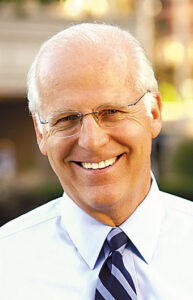
Public Policy in the Era of Political Extremes: Getting Back to the Center
Former Congressman Christopher Shays will talk about the challenge of having both political parties playing to their extremes, and what the general public can and must do to help bring public policy back toward the middle of the political spectrum. The discussion will include what we should expect/demand from our elected officials.
Christopher represented the 4th District in Connecticut from 1987 to 2009 in the United States Congress. Before then, he served 13 years in the Connecticut General Assembly. A moderate Republican, socially progressive and fiscally conservative, Shays had a strong and successful record of reaching across the aisle to address our Nation’s problems.
The only Republican Congressman from New England re-elected in 2006, Shays was consistently recognized for his bipartisan leadership. During his 21 years in Congress, Shays rose to become a senior member of the Budget (Vice-chair), Financial Services, Homeland Security, and Government Reform (Vice-chair), committees, and Chaired the Reform Committee’s National Security Committee with oversight of the Defense and State Departments.
Shays was the primary author of the laws requiring: Congress to live by the acts it writes for the rest of the nation; Congressional gift ban; lobby disclosure; campaign finance reform. As chairman of the National Security Committee, he helped establish the: 9/11 Commission; Director of National Intelligence; Department of Homeland Security; and led 19 oversight trips to Iraq, meeting with our troops, Iraqi government officials, Shia and Sunni leaders, and their followers.
After Congress, Shays Co-chaired the Commission on Wartime Contracting. Then served as a Distinguish Fellow in Public Service at the University of New Haven, and later as a Resident Fellow at the Harvard Kennedy School, Institute of Politics.
Christopher and his wife, Betsi, are former Peace Corps volunteers (Fiji). As a former volunteer, he championed the Corporation for National and Community Service, helping create AmeriCorps.
Christopher Shays is a graduate of Principia College, NYU’s Stern School of Business (MBA), and its Wagner School of Public Administration (MPA). Christopher and Betsi have a daughter Jeramy Alice, and now reside in Easton, Maryland.
Speaker suggested by Tom Igoe.
Speaker Summary
Former Darien resident and U.S. Congressman Chris Shays shared his thoughts on what good representation and service to his constituents and the country looks like. He started with thoughts on how his upbringing in a town where some groups/minorities were not well represented (and, perhaps, welcome) and where having parents that emphasized the importance of work and engagement on the events of the times (influenced by nightly dinner discussions around topics his father pulled from reading newspapers on his daily commute to-and-from NYC) related to his future in politics. He also mentioned how his third-grade teacher at Hindley School influenced his love for reading and our country and inspired his interest in going into government work early-on in his life.
Shays then talked about how, upon returning from his service in the Peace Corps and moving to Stamford, he began his career in politics. He emphasized that he learned early-on to listen, engage and not make stereotypical assumptions about his constituents to better understand their views, needs and what he needed to do to serve them. He shared several pointed stories that demonstrated this.
Chris spoke about how, despite being/coming from a Republican home, he was influenced by JFK’s view of commitment to the future and doing what was in the best interests of the country and future generations. He said, “Kennedy spoke to him” and influenced his view of government service – focusing on what politicians should do for their constituents/the country versus what they wanted for themselves.
Shays talked at length about taking time to understand what those who had different views than you believed, with the focus on why they believed it so he could represent all his constituents and better work across-the-aisle to find compromise solutions. And, how compromise to getting to solutions was more important than holding out to win. He was especially critical of the current news media that focuses on one side of issues based on their politic bias, contributing to the lack of a complete understanding that feeds so much of our partisan politics and ideology.
After 20 minutes of prepared comments, a very engaging 40-minute Q&A session allowed Chris to expound upon and embellish his views on what good, bi-partisan service and partnership looks like, his concerns about the current state of politics and his thoughts on some of the key issues facing our country and world today. He mentioned 3 key changes he thinks are critical to an improved democratic process: eliminating gerrymandering as a hindrance to proper representation; concerns with the electoral process/the electoral college that enables the President to be elected without the majority support of the voters; the Senatorial filibuster as a barrier to legislative progress.
Chris closed with two examples from his time as a congressman when foreign leaders expressed powerful views of the United States as a world leader making him feel especially proud to be in his position and of our country, and how he wonders if we are still viewed this way based on the current state of U.S. politics/leadership.
